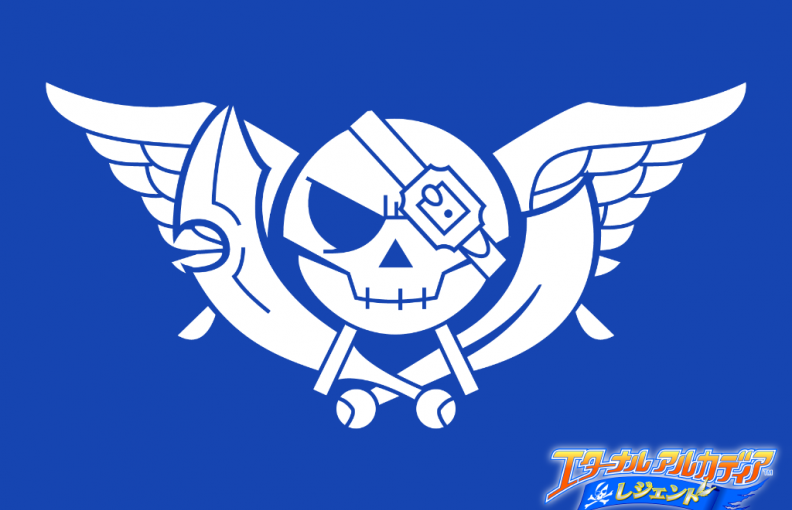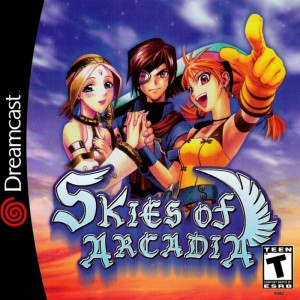
(This review may contain spoilers for the following games. If you have not played the game before, please exercise caution before viewing this post. You have been warned.)
I’ve always been a giant SEGA fan, as my youth involved playing many games on the Sega Genesis, Game Gear, and DreamCast. Of course, after the DreamCast I switched to Nintendo console, and today I attempt to relive my gaming life by playing games of all consoles and generations. However, one RPG game that continues to resonate with me is Skies of Arcadia for the DreamCast. I never got the chance to fully beat the game until recently, and upon completion, I feel the game remains under-praised and deserving of a re-release.
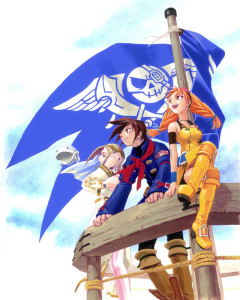
Skies begins in the general jRPG scenario, starting with main protagonist Vyse, and his childhood friend Aika. After some tutorial-based missions, mainly involving the infiltration of a military vessel under command of a giant neighboring navy, Vyse meets a mysterious girl named Fina, who hides her past due to her ‘mission.’ After certain events, Vyse’s home island gets attacked by the very same military from before, and they kidnap all the men on the island, including Vyse’s father and crew. This leads to a sequence of events that will later lead Vyse, Aika, and Fina on a journey to save the world. It’s all standard jRPG storytelling, and honestly speaking, Skies doesn’t really depend on its story to hook the players. Being a big story person, I generally get disappointed in games with lackluster storytelling, but Skies manages to still hook the player with combat and exploration, along with world building, so I can still give it a pass for the story.
Even still, as I ponder the events of the game, I still need to praise the wonderful writing in the game. While the events remain mediocre, the writing really pushes the plot forward, and leads the game in directions unknown. While I knew some of the events that would happen, the game still wrote them in a way that was fun and unique. I laughed at the game, and even with rough patches of random battles, I still found myself looking forward to the next cut scene. In addition, the game introduces choices to make throughout the game, making your ability to make correct choices matter in the face of danger. While these decisions are not timed, they do affect your pirate ranking, which comes into play as you progress, making the adventure all the more rewarding.
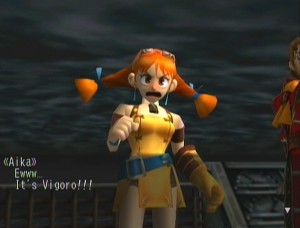
The biggest draw to Skies definitely comes from the Airship battles. In Skies, Vyse generally commands an airship to traverse the world. The world in Skies consists of numerous islands and blockages to direct the player’s path to new lands. However, during the game there exist both random Airship battles and event battle, both of which have the player commanding the ship to make certain moves and attack the opposing ship. These cinematic battles have a special charm to them, and they can break the pace of the generic RPG grind in the game. They offer unique opportunities to level up the party, and they have a certain impact that other battles fail to meet. Just imagining a large scale battle between your ship and the opposition as you swerve to get behind the opponent and use your special weapon to deal massage damage just feels all too satisfying. I love the Airship battles, and the abundance of fights just felt exciting and wonderful.
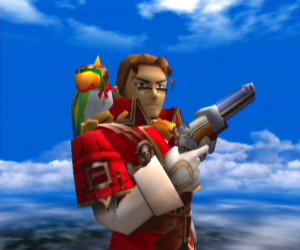
I wish I could say the same for our regular battles in the game. Each battle in Skies consists of a turn-based battle system that pits the player with their party of up to four characters against the monsters. As you progress the dungeons, random battle will come to impede your progress. Nothing special, as an RPG of its time. However, the battles use a general attack, defend, special, magic, and charge system. This adds depth, as each character uses their own special moves that can be learned as the game progresses, but it also adds a party meter which limits the amount of magic and special moves that can be used each turn. However, while I felt the game didn’t add any special feature in this battle system, it was still fun to play. Personally, I don’t really care for the battle system, but it didn’t add any unnecessary or obnoxious tasks to perform each battle. The battles were straightforward, and while forgettable, I still wanted to keep playing.
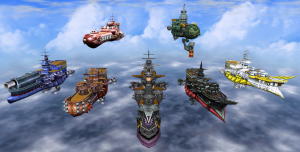
I’m going a little out of order here, but let me talk about the wonderful characters in Skies. Vyse, the main protagonist, starts the game as a naive young pirate, still learning the ropes in the world. Aika, his childhood friend, supports Vyse and their chemistry radiates throughout the game. Fina, the mysterious new girl, shows her ignorance of the world as she travels with the two, and slowly gains the trust of the others, as well as opens up to them as their journey continues. Along the way, we meet others who join in on the adventure, and act as a fourth party member in their battles. This fourth member aids the crew and often contributes to push the story along. They also often act as a mentor to the crew, and help develop each party member as a person. When it comes to the antagonists, each one generates conflict with the party through their own means, and advances the leading plot behind the scenes to create an ends which leads to the final conflict in the game. Each character in this game develops and fleshes out with the passing of events in the game, and adds an element of joy to the game.
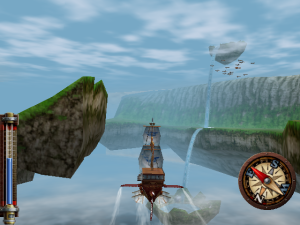
When it comes to the audio of the game, as a Sega game, Skies definitely delivers. Each song in this game offers the thrill of adventuring and intensity of battle. Boss battles change their music depending on the circumstance, a detail I have always loved. Games that incorporate musical features such as interactive music themes, have always placed high in my favorite video game list, and Skies really “Wow”-ed me. In addition, Skies contains a final boss track that skill resonates with me, and a particular village theme reminds me of the ending to Star Wars VI. Of course, Skies just has a plethora of great music, and I really wish more people knew about each track.
Skies of Arcadia fell under the rug due to the demise of the DreamCast, but a port of the game was later released for Nintendo’s GameCube, titled Skies of Arcadia Legends. This port added new bosses, new content, and condensed the game into one disc, but unfortunately, due to the compression, the music fails in comparison to the Dreamcast original. Of course, other than the music, Legends became the definitive version, and each version commands a decent price in the market, but in my eyes, each one is worth this value. Plus, the loading in the GC version makes up for so much lost time. The DreamCast had some bad loading times, when compared with Legends.
jRPG fans looking for an unforgettable adventure should take a look at Skies of Arcadia for either system, and really buckle down for the adventure. The game contains great features such as Airship battles, but also contains lovable characters and a fun battle system. The music ties the adventure together, and the fun never ends with the game. Skies of Arcadia, while not my favorite RPG, ranks high on my list due to these reasons, and while not a perfect RPG, it delivers a classic RPG touch and a passable story, filled with a youthful story often forgotten in worlds striving to be the grittiest, most realistic game on the planet. I would recommend this game for any jRPG fan yearning to adventure like the older days.
